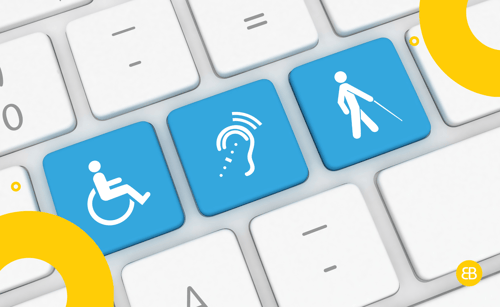Web Accessibility in App Development: Best Practices & Guidelines

Web accessibility means designing your app or website so that people with disabilities — including those with visual, hearing, motor, or cognitive impairments — can use it easily and effectively.
Why It Matters
-
Expands your reach by making your app usable for a wider audience, including users with disabilities.
-
Reduces legal risk by meeting global accessibility standards like WCAG and ADA.
-
Improves usability for everyone, not just users with impairments.
-
Enhances SEO and mobile-friendliness, boosting visibility and engagement.
-
Shows brand responsibility and inclusiveness, building trust with users.
Use This Term When...
-
You're designing app interfaces or choosing fonts, colours, and navigation styles.
-
You’re discussing compliance with accessibility laws or WCAG guidelines.
-
During QA or UX audits focused on screen reader compatibility and keyboard navigation.
-
Testing alternative input methods like voice control or switch access.
-
Planning inclusive user testing or conducting heuristic checks.
Real-World Example
In one of our projects, we prioritised web accessibility by implementing screen reader support, proper contrast ratios, and keyboard navigation. This made the app inclusive for users with disabilities and ensured compliance with accessibility standards.
Founder Insight
Web accessibility isn’t just about compliance — it’s about empathy. Ignoring accessibility means shutting out millions of potential users who could benefit from your product.
Key Metrics / Concepts
-
WCAG Compliance Level – Guidelines that define how accessible your digital product is (A, AA, AAA).
-
Contrast Ratio – Measures text visibility against backgrounds for readability.
-
Keyboard Navigation Support – Ability to use the app without a mouse.
-
Screen Reader Compatibility – How well your content works with assistive tech.
-
Alt Text Coverage – Percentage of images with meaningful alternative descriptions.
Tools & Technologies
-
WAVE Accessibility Tool – Visual tool for evaluating page accessibility.
-
axe DevTools – Browser extension to automate accessibility testing.
-
NVDA / VoiceOver – Popular screen readers used for accessibility testing.
-
Lighthouse (Chrome) – Includes automated accessibility scoring in audits.
What’s Next / Future Trends
Web accessibility is gaining traction as a default design standard, not a niche requirement. AI is helping identify and fix accessibility gaps in real time, while laws worldwide are tightening compliance expectations.
Related Terms
-
UI Design – Affects layout and interaction patterns for accessibility.
-
UX Design – Inclusive UX ensures equitable experiences for all users.
-
Heuristics Check – Often includes accessibility best practices.
-
Voice Analytics – Can support non-visual interfaces.
-
Content Strategy – Helps ensure clarity and readability for all users.
Helpful Videos / Articles / Pages
Blog: 5 Ways to Make Your Ecommerce Website More User-Friendly
Call to Action
Want to ensure your app is inclusive and compliant? Book a discovery call — we’ll help you design with accessibility in mind from day one.